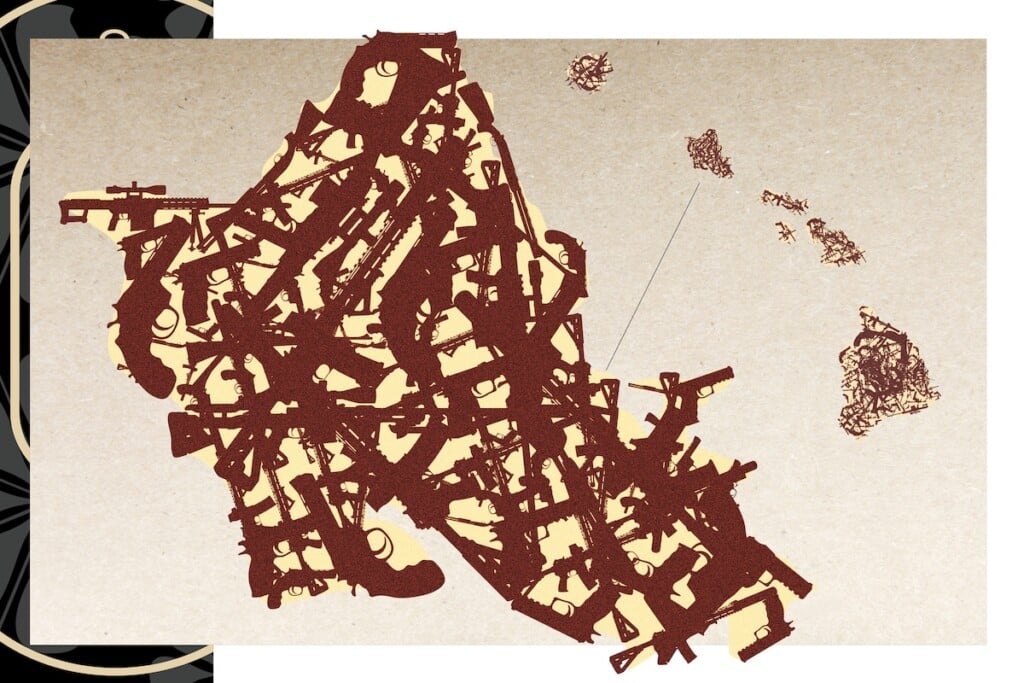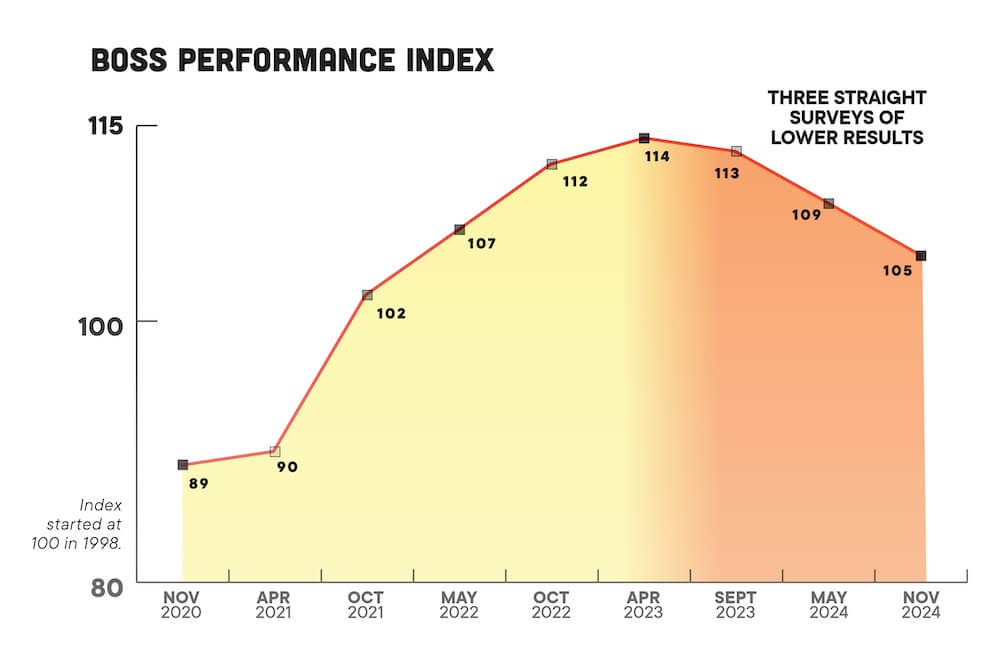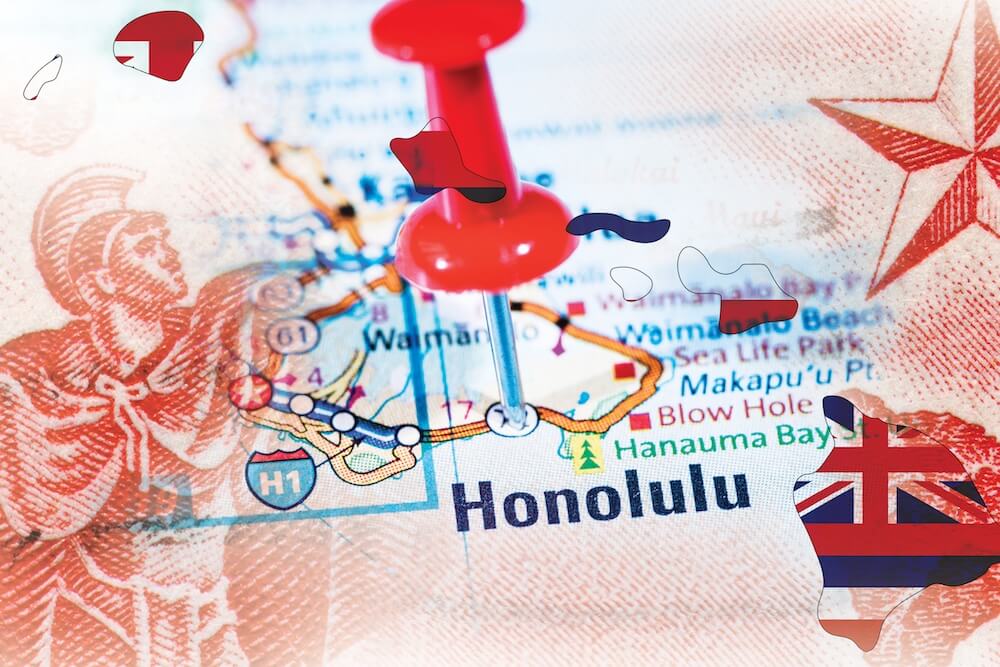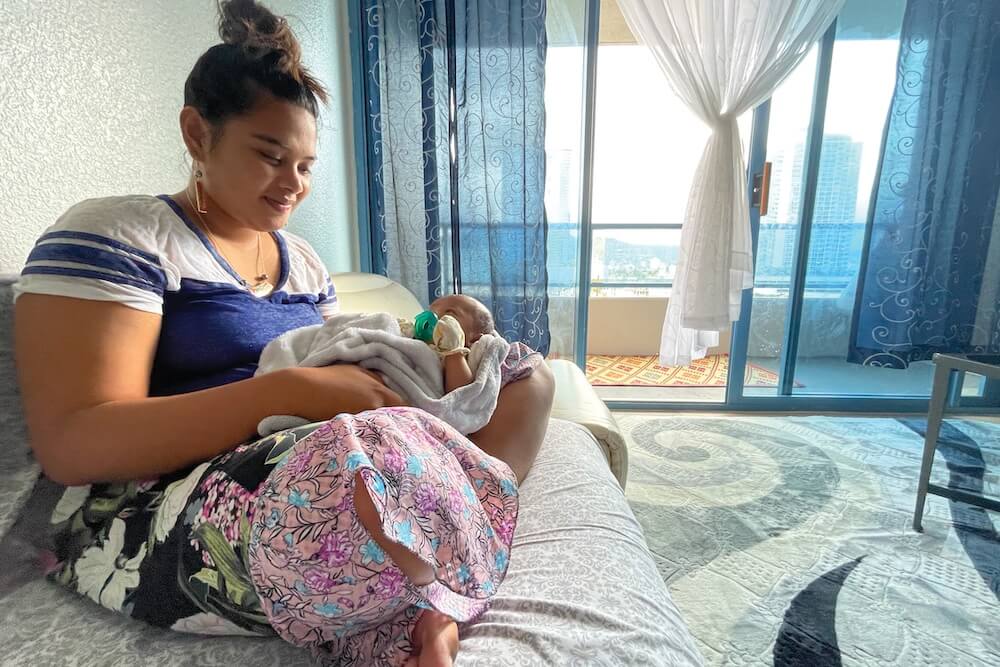More Guns, More Gun Violence in Hawai‘i
Firearm registrations are up 280.5% since 2000, with gun deaths rising sharply as well. Should Hawai‘i be doing more to control firearms?

News Reports of Gun Violence and Crimes
News reports of gun violence and crimes tend to lead to increased gun sales, says gun shop owner Mia Mijuskovic.
“When there are high-profile incidents, many people feel a heightened sense of insecurity, leading them to consider purchasing firearms for self-defense and protection,” she says.
Mijuskovic, owner of the Firearms International store on Nimitz Highway, says that since the store opened in 2021, she’s seen a steady increase in sales, particularly in ammunition and handguns.
Data from the Hawai‘i Department of the Attorney General’s registration report confirms that gun sales in the Islands are up – and not by a little. In 2023, 23,528 personal firearm permit applications were processed statewide, a 7.5% increase from 2022.
The report says that from 2000 to 2023, the annual number of statewide permit applications that were processed increased by 262.6%, annual firearm registrations grew 280.5% and the number of firearms annually imported into Hawai‘i increased 263.4%.
Meanwhile, in four of the past five years, statewide crime reports show the percentage of murders, robberies and aggravated assaults committed with firearms was higher than in any other year this century. Mijuskovic says customers at Firearms International are a diverse group – mostly everyday people – and many are first-time firearm owners. Others have some experience with guns and some want to learn more about firearm safety and the handling of firearms.
“With rising safety concerns, we’ve noticed a shift where individuals who were previously not interested in firearms are now exploring their options for personal protection,” she says.
What You Need to Buy a Gun
To buy a handgun in Hawai‘i, you need to pass a background check, obtain a permit to purchase, pass a proficiency course and register the firearm. A minimum 14-day wait is required after applying for a purchase permit. Once a permit is approved, an applicant can buy a gun, which will have to be registered with the county Police Department; all ammunition must be registered with county police as well.
Mijuskovic says her company has grown and diversified in the past three years and now provides courses that teach firearm safety and the proper handling of firearms. And the demand for ammunition has been consistent as people build their personal ammunition inventories.
She expects sales to keep growing. “The future of gun sales is undoubtedly influenced by evolving laws and regulations, many of which have a positive impact on our business,” she says. “We remain committed to … meet the demand for firearms, safety training and responsible ownership.”
The Giffords Law Center to Prevent Gun Violence, which advocates for strong gun control laws nationwide, says that the stronger a state’s gun laws, the lower the state’s gun death rate. The center’s latest assessment ranks Hawai‘i’s gun laws as the seventh strongest among the 50 states – California is No. 1 – and Hawai‘i’s gun death rate is the fifth lowest.
The Johns Hopkins Center for Gun Violence Solutions, which says it uses data from the Centers for Disease Control and Prevention, reports that Hawai‘i had the third-lowest gun death rate in the country in 2022. That year, the center says, there were 66 reported gun deaths in Hawai‘i – 18 homicides, 45 suicides and three others (others include accidental deaths). The center said the gun death rate in Hawai‘i increased 71% from 2013 to 2022.
For two decades, the annual review of uniform crime reports from the Department of the Attorney General has listed the percentage of murders, robberies and aggravated assaults reported statewide that were committed with firearms. That overall percentage has gone up in recent years.
2016 set a record high, which was broken by a new record high in 2019, which in turn was broken by a new record high in 2020, the latest year for which data is available. That 2020 record: 13.5% of murders, robberies and aggravated assaults reported statewide were committed with firearms.
Supreme Court’s Landmark Ruling
In the case of New York State Rifle & Pistol Association v. Bruen, the U.S. Supreme Court ruled in 2022 that individuals nationwide have a right to carry handguns outside of a home for self-defense reasons – a major victory for gun rights advocates. But the court also ruled that states can require gun permits that obligate applicants to satisfy certain criteria before obtaining a permit to carry a gun. Hawai‘i is among the states that require gun buyers to obtain a permit.
In response to the Supreme Court ruling, the Honolulu City Council passed the Sensitive Places Bill, which specified places where guns are not allowed, including buildings owned by local, state and federal governments; schools and child care facilities; and hospitals.
Kainoa Kaku, president of the Hawaii Rifle Association, says gun laws in Hawai‘i create challenges for responsible gun owners and buyers.
“It is a little difficult to navigate the laws, because just like liquor laws in the United States, firearms laws vary from state to state, and Hawai‘i is on the more restrictive side of the spectrum, similar to New York and California,” Kaku says. “We’ve done our best over the last few years via lawsuits, to kind of streamline the process and make it a little bit easier than it is.”
For example, he says, firearm registration can be done online, but to obtain a permit to buy a gun, Honolulu police require people to apply in person at police headquarters, where Kaku says applicants can wait hours for help.
“From one day to the next, things may differ, but … every single person who wants to register a gun or apply for a permit to acquire a gun needs to go down to the main HPD station on Beretania,” he says.
Kaku says a five-year license to carry a concealed gun costs only $50 in Arizona; in Hawai‘i, a course leading to a safety assessment – just one of the requirements to carry a gun – can cost $250 and must be retaken every four years.
Chris Marvin, a military veteran and the founder of Marvin Strategies, is a local advocate for gun control.
“Hawai‘i has done a great job historically of having strong gun laws, but we are falling behind,” Marvin says. “Other states are doing more, and the Supreme Court decision a couple years ago meant that more people in Hawai‘i will have guns, which always leads to more gun violence.”
He says that Hawai‘i can learn from Massachusetts, which passed an omnibus bill last year updating all gun laws in the state.
“The reason we’re behind is because, for so long, gun violence wasn’t the top issue that people in Hawai‘i cared about,” he says, adding that residents typically voted based on other issues like housing or food insecurity.
Hawai‘i law currently restricts pistol magazines from holding more than 10 rounds of ammunition; the high-capacity magazines frequently used in mass shootings allow a shooter to fire more rounds without reloading. But Hawai‘i law does not ban high-capacity magazines for rifles.
Michael Siegel, a professor in the School of Public Health at Boston University, says that “whether a state has a large capacity ammunition magazine ban is the single best predictor of the mass shooting rates in that state.”
In other words, he says, states with bans usually have lower mass shooting rates than states without bans.
Buyback Event Collects 514 Guns
To take guns off the street, the state departments of Law Enforcement and Public Safety launched a no-questions-asked buyback program in 2023. At an August 2024 event at the Aloha Stadium parking lot, people turning in guns received either a $100 or $200 Foodland gift card per weapon depending on the gun, with a maximum of three gift cards per person. That event collected 514 guns.
“A buyback program is great for people who have somehow come to possess guns of any sort and don’t want them anymore,” Marvin says. Maybe they inherited the gun, or “acquired an unserialized gun, what we call ghost guns, and they want to get rid of them now that it’s illegal to possess them, that’s a great opportunity.”
The Honolulu Police Department is seeing a rise in “ghost guns,” or guns that are untraceable. In New York City, UnitedHealthcare CEO Brian Thompson was killed by a ghost gun created using a 3D printer. In Hawai‘i, police confiscated 88 ghost guns in 2024.
In August 2024, a Wai‘anae man fatally shot his neighbor in self-defense after the neighbor shot two women, destroyed cars and entered his property. The man wasn’t charged, but after the incident, some people called for stronger laws for self-defense at home. However, Marvin, the gun control advocate, says the law worked exactly as it should have.
“As a citizen in Hawai‘i, just like every other state in the country, you have a right to use deadly force if you feel like your life is in danger, and if you’re in your own home, you have even more ability to do that,” Marvin says. “People and the voters and the citizens need to know our self-defense laws are strong. They work well. They did in Wai‘anae, and they’re all we need. We do not need to have an aggressive law that allows people to kill if they’re not in mortal danger. That should be the standard, and most people would agree with that.”
In September 2024, the Waianae Coast Comprehensive Health Center called the increase in gun violence in the area a public health crisis and, in response to multiple shootings in August, Honolulu police increased its presence on the West Side.
On New Year’s Day 2024, a man who shot at three people with an unregistered AR-15-type weapon led Honolulu police on an islandwide chase that ended in a shootout, with two officers wounded and the man killed.
In Hawai‘i, it’s legal to own assault rifles like the kind used in many mass shootings on the mainland – it’s only assault pistols that are banned, Marvin says.
“It’s only a matter of time if we don’t close this (assault rifle) loophole before we’re going to see something like we see so often on the mainland, a tragedy that takes a lot of lives, because those assault weapons enable a perpetrator to take more lives than they would without that type of weapon.”
In Hawai‘i, less lethal weapons like tasers, stun guns, pepper spray and certain knives are allowed, though some restrictions apply. However, butterfly knives, gravity knives and switchblades are banned.
Hawaii Business Magazine repeatedly requested various statistics on gun violence from the Honolulu Police Department. Hawaii Business waited 80 days for a response before publishing this story without one.
Gun Education and Safety
Shootings are the leading cause of death among children and teens in the U.S. According to Johns Hopkins’ Annual Firearm Violence Data report, “2,526 children and teens ages 1 to 17 died by a firearm in 2022 – an average of 7 deaths every day.” The national gun death rate among youths doubled between 2013 and 2022, the report said. In Hawai‘i, firearms were the second-leading cause of death among children and teens age 1-17 from 2018 to 2022, according to Johns Hopkins.
The University of California at Davis Health System says that the most effective way to prevent firearm injuries in children is to not have a gun in the house. If guns are in the house, they should be stored in a lockbox or locked safe, with ammunition stored in a different place.
Kaku, the rifle association president, says gun owners should talk to their children and set clear boundaries to help prevent accidental shootings.
“There’s a bunch of great gun organizations that have taken it upon themselves to educate the public, and even just jumping on YouTube and watching videos, you can learn a lot about safety and how to safely operate a firearm and common mistakes that people make. The biggest one is with kids,” he says.
“There’s a lot of new gun owners that feel like they have to hide the fact that they own guns from their children, and that is absolutely the wrong thing to do. If you have children and you have guns, you should teach them about how dangerous they can be when they’re used improperly.”
Kaku says his daughter knew the rules of gun safety when she was as young as 3, and that by the age of 4, she had shot her first handgun. “It’s all about properly educating your kids, properly educating the public.
“When it comes to guns, lawful and responsible gun ownership, education is everything, and that’s our mission” at the Hawaii Rifle Association, he says.






